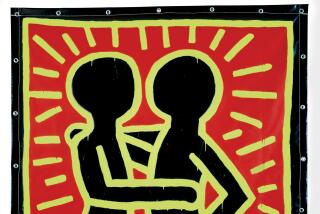JAZZ REVIEW : SHEARING BRINGS BACK OLD MEMORIES
- Share via
NEW YORK — In one of the jazz festival’s less conventional ventures, George Shearing plunged through a time warp Monday at Town Hall to play in settings that recalled his formative years in England and his early days in New York. Leading a 1930s Dixieland group and a 1940s bop combo, he was also heard in a set of piano duets with Hank Jones.
The traditional tunes afforded Shearing a chance to summon up his memories of Earl Hines, Bob Zurke and the like as he settled comfortably into the mood of the moment, aided by such veterans as Kenny Davern, George Masso, Slam Stewart and Warren Vache. For the occasion, he had written simple functional charts to bring a neat sense of cohesion to “Jazz Me Blues”; a strange change of tradition for a Jobin standard, which he announced as “Dixiefinado,” and even a “Lullabye of Dixieland” disguise of his famous Birdland dedication.
The only fault was Shearing’s modesty. Sometimes he would play just an eight-bar solo, of which two bars were swallowed up by applause from the previous soloist. When he did stretch out, as in “Nobody Else But Me” and in his own 1945 composition “Alice in Dixieland,” he displayed a rarely heard side of his personality.
The evening’s most rewarding moments were furnished by the piano duets. Shearing and Hank Jones meshed joyously on Bud Powell’s “Hallucinations” and Charlie Parker’s “Conformation,” with Shearing shifting gears now and then from be-bop into stride. The variously delicate and driving communication between these masters was a total delight.
The be-bop set, although Shearing fitted just as easily into the contrasted setting, was only sporadically successful. Oddly, it was the captain who let down the team: Dizzy Gillespie was having an off night, missing notes on tunes he has been playing for 40 years. Only during the last two songs did the group come together. Jimmy Heath’s tenor sax was expressive and Jimmy Cobb set the right beat on drums, but the phenomenal bassist Eddie Gomez seemed too eager to show off his techniques.
That the Gillespie lapse was only temporary became clear Tuesday at Carnegie Hall when the trumpeter’s imminent 70th birthday (Oct. 21) was saluted in the form of a big-band session under his direction. The occasion was an important challenge, one that he was ready and eager to meet, as he directed the ensemble with its powerhouse brass section through arrangements that sounded amazingly modern after four decades of wear and tear: “Emanon,” “Night in Tunisia,” “Manteca” and the whirlwind, prophetically titled “Things to Come.” Only an inept sound system diminished the impact of this admirable band, which will stay together for tours of Europe and Japan.
Typically, Gillespie accorded generous solo time to the four other accompanists--five when Wynton Marsalis joined the team for the finale. It was Jon Faddis who stole the honors. Gifted with power like a dynamo and a mind like a Rhodes scholar, he almost literally blew all the other sidemen away.
Marsalis had already appeared in an opening set devoted to Gillespie tunes and to a running commentary in which he spoke, with expertise and not too much of his normal condescension, about life, art, civilization and Gillespie. His solos were somewhat clinical and the tempos were at times too fast. It was only when he played his own attractive ballad, “The Source,” dedicated to Gillespie, that his latent warmth rose to the surface, reminding us that inspiration beats derivation every time.
The recent 99th birthday of Irving Berlin and the death of Fred Astaire provided twin inspirations for a piano recital Tuesday by Dick Hyman at Weill Hall. In a flawlessly performed hour, Hyman took us back to the century’s early years in a panorama that included “Grizzly Bear Rag” (the lyric of which he recited in a dryly humorous monotone), “Top Hat,” the poignant “Suppertime,” which Hyman pointed out sounds more like a Harold Arlen song, and the hilariously anachronistic lyrics to “I’ll See You in C-U-B-A,” which Hyman sang. Such elegant early Berlin creations as the little-remembered 1920 song “How About Me” were welcomed back to life in this splendidly researched program.
More to Read
The biggest entertainment stories
Get our big stories about Hollywood, film, television, music, arts, culture and more right in your inbox as soon as they publish.
You may occasionally receive promotional content from the Los Angeles Times.










